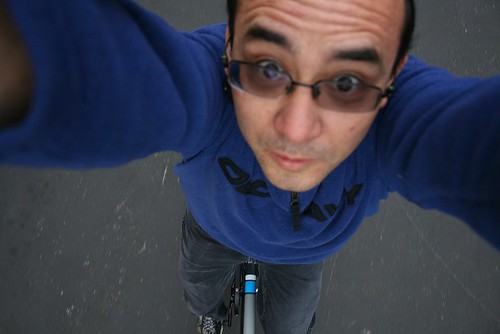My son is learning chemical compound naming conventions. Oxyanions (i.e. polyatomic negatively charged ions with oxygen atoms combined with another element) are named hypo-*-ite, *-ite, *-ate, and per-*-ate, depending on the number of oxygen atoms in the anion. Hypo-*-ite has the least number of oxygen atoms, while per-*-ate has the most oxygen atoms.
He was having a little trouble remembering if hypo- means the least or the most, so the first word that came to my mind to help him remember was “hyponatremia.” Who besides a fitness nut even knows what that word means?

Action Wipes 20% off coupon code.
BFTROU reviews Dahon Eco 3.
Yehuda Moon comic books are a good Christmas gift idea.
Bike Hugger and taking better bike photos.
A new edition of The Spokesmen Cycling Roundtable podcast was recorded over the weekend. Go say hello to them.
Infra-, like hypo-, means beneath, below or under.
You can double your chemistry knowledge with “hyponatremia” as -natremia comes from natrium where we get the abbreviation Na for sodium. When I was a wee chemist I used hypodermic (“under skin”) needle to remember that hypo is below and hyper is above – that was before I became more sporty (nerdy?).
We’re all so nerdy either way you look at it.
My son’s learning all of those obscure Latin roots with chemistry: plumbium, argentium, etc.
Howdy, Richard–
I’m no fitness nut; good health is a by-product of my recreational compulsion. However, I know what hyponatremia is. Back when I was a guide I took my parents on a multi-day backcountry trip for their 60th birthdays, and I had them invite friends. One of the guests had kidney troubles, which he didn’t reveal to me at the beginning of the trip, when I asked about potential medical issues. On the second day out, he was uncomfortable and wanted to ride in the support vehicle. Being in the desert, I assumed he was probably dehydrated. I told him to drink plenty and enjoy the scenery. What he didn’t tell me was that he had filled his Camelbak twice the afternoon before, and he hadn’t peed. His one good kidney had shut down, we later learned. His body was flooded, his cells drowning. He probably wouldn’t have survived without a helicopter.
Before the trip, my father had asked if he should bring his GPS. I told him no, I knew where we were going. Someone else asked if I had a phone. No, I said, we won’t be needing to talk to anyone we can’t see.
We called 911 on a phone someone else had brought. The dispatcher and helicopter pilot didn’t know the area we were in; my father fed them coordinates from the GPS he’d brought against my advice. When the helicopter landed, the first thing the pilot said was, “It was a damn good thing you had those coordinates. We never would have found you.”
I learned a lot that day.
Ron Georg
Corvallis, OR
Yikes! That’s a pretty hard way to learn those lessons. Sounds like a close call. Glad your guest survived.
Hi..I am reading your page for a few days now is there any way to subscribe by email.
Printer Plano TX
cash for gold new york